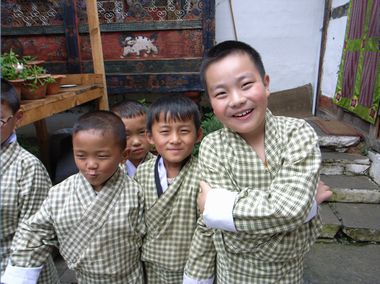 Copyright JFS
Copyright JFSThe term "Gross National Happiness (GNH)" refers to a unique way of thinking. I would like to discuss what GNH means for us based on experiences from Bhutan, where the term was born.
Link to the article on JFS: http://www.japanfs.org/en/pages/029742.html
Link to the article on JFS: http://www.japanfs.org/en/pages/029742.html
Living in Rapidly Changing Times
First, I'd like to talk about the history of GNH. Various changes have taken place in human history, which is thought to span six million years or so. In those years, we moved out to the savanna from forests, became upright to walk on two legs, made stone tools and began to use a fire. About 12,000 years ago, agricultural activities began, and agriculture and the raising of livestock spread throughout the world over a few thousand years.
About 5,000 years ago, what we now refer to as "civilization" was born. Humanity had reached most of the habitable locations on Earth by that time, and they began to develop unique cultures in various many of these. When the world was populated by about 100 million people, this lead to a so-called ocean of culture. There was a culture in each valley, and anyone crossing a mountain would find a new language and worldview. Humans had achieved a rare diversity. In this vast ocean of culture, a particularly alien culture spontaneously developed, as if it came from an undersea volcano. This culture became known as civilization, and soon spread throughout the world.
We often forget, however, that most civilizations in history have perished. I wonder about whether our modern civilization will ever perish, and if modern civilization is undying, what are the reasons?
Large changes have taken place in the world over the past decade or two, markedly changing people's outlooks. The notions of "common sense" and "natural" have been called into question. The word "sustainability" has become more prevalent. People are now realizing that our existing lifestyle cannot be sustained indefinitely. We are living in such turbulent times, and as we witnessed the failure of large, long-established companies such as Lehman Brothers Holdings Inc. in the summer of 2008, many people began wondering whether describing this as the crisis of the century was over-optimistic. It is possible that a major transformation, the type seen only once every 1,000 or 2,000 years, is happening now.
Some of the most influential figures in human history, including Lao-Tzu, Buddha and Christ, appeared 2,000 to 2,500 years ago. They all warned mankind about our concepts of civilization, particularly the affluence at the heart of civilization.
Civilization Built upon Fantasy
According to the calculations by economist John Maynard Keynes, humanity achieved an average economic growth of 100% every 4,000 years until the industrial revolution, which works out to 1% every 40 years. A change of 1 to 2% in an entire lifetime is so slow that people would not have realized it. Thus, the concept of "economic growth" did not exist at that time.
Since the industrial revolution, however, economic growth has averaged 100% every few decades. At an estimated rate of 100% in a 40-year period, the economic growth rate is now 100 times higher than that before the industrial revolution.
But it is even higher today. In the 20th century, economic growth accelerated, particularly in countries like Japan, whose economic development was among the fastest in the world. When I was a child, the speed of rapid economic growth was more than 10% a year. We are now in an era with economic growth rates hundreds of times greater than those before the industrial revolution.
We have accepted an idea that the economy grows according to destiny or physical laws. Most societies have achieved economic growth with the aim of becoming more affluent. In other words, the fantasy of affluence has spread throughout the world.
However, I would like to question the differences between modern civilization and past civilizations that perished after flourishing for thousands of years. First, a quantitative different is outstanding. The speed of economic growth for modern civilization has followed an exponential curve, and such economic growth has spread worldwide (globalization). This does not have roots in traditional cultures or in specific areas, as was the case in the past.
How can a civilization become so large? This question overlaps with the question of differences between modern civilizations built upon the industrial revolution and other civilizations that perished. The biggest difference is probably the use of fossil fuels.
Before fossil fuels became popular, human used biomass energies. The current efficiency of biofuel is 1.34 times, which means that when you put in one unit of energy, you receive an output of 1.34 units. However, oil easily achieves 100 times that. This simple comparison also illustrates the degree of change from the era of biomass energies to the era of fossil fuels. In the last century, humans have been building their societies on the premise that we have 100 times the energy we used to have. Economics, politics, the legal system, international relations, military affairs and human relationships have been built under the notion that this energy excess provided by fossil fuels will last forever.
In other words, the world we live in is built on fantasy, as fossil fuels will not last forever. The peak oil theory has actively been discussed around the world. We have already used half of the world's oil reserves, and the cost is expected to soar in the near future. Conflicts for the control of fossil fuels continue in places like Afghanistan and Iraq, and will likely become increasingly severe. Global climate change is also a major concern. Conflicts and climate change, the results of building a world based on fantasy, now weigh heavily upon us.
Can We Measure Affluence?
It is possible to measure affluence. This is a major concept in economics. The most representative examples are GDP (gross domestic product) and GNP (gross national product). The term "product" refers to goods or services, and GDP and GNP are measures of the amount of money available to obtain such products. People have long thought that as the amount of money increased, the affluence of a society also increased. In addition, people believed that as GDP or GNP and affluence increased, society would become happier. Thus, within the concept of "affluence", "happiness" was set.

Philosophers who lived 2,000 to 2,500 years ago and modern day wise men such as Mahatma Gandhi or the Dalai Lama, have all said that the concepts defining affluence and happiness were error-prone.
In a campaign speech during the U.S. presidential election of 1968, Robert Kennedy asked the audience to consider what is included and what is not included in the world-leading American GNP. For example, the weapons used in wars are included in GNP calculations, while the welfare of children and empathy for fellow human beings are not calculated. Kennedy said that "Our motivation in life is completely different from GNP."
The king of Bhutan, a small country that had one of the lowest GNP values in the world, devised "GNH (gross national happiness)" in the 1970s. The new king, who took over the throne at the tender age of 16 after his father died, said GNH was more important than GNP. It may have been a simple word game for him to replace "happiness" for "product", but the Bhutanese took it seriously as a nation policy, after 30 years of discussion, in 2008, the term GNH was included in Article 9 of the first Constitution in the Bhutan history. The article says that guaranteeing GNH is the government's responsibility.
The four pillars of GNH are as follows: 1. affluence of natural environment; 2. conservation and promotion of traditional culture; 3. good government - Bhutan is a rare example, in that the king himself called for the peaceful change from a monarchy to a democracy; and 4. economic growth, or rather, "fair economic growth"; the idea is that a small minority of people becoming wealthy cannot be called economic growth.
Keyword of Culture is Happiness
We currently live in a sea of civilization, and different cultures are like islands barely staying afloat. What is the difference between civilization and culture? Some have said that civilization defines the limits of what people can do, and culture defines the limits of their actions. According to this, we could say that the theme of civilization is affluence and the endless desire to pursue it, while the theme of culture is happiness and wisdom to know how to obtain "sufficiency."

The definition of happiness differs among different people and cultures. This is why we cannot truly quantify or measure GNH. Nevertheless, we are striving toward happiness. What is a happy society? Even the definition of happiness differs from person to person, and there might therefore be a minimum requirement to create a happy society. I think that the Bhutanese has the right idea with their four pillars.
After 100 years of consideration by cultural anthropologists, the definition of culture remains unclear. However, I believe that it is sufficient to say that there are three principles of culture; local, communal and ecological.
First, be local. Culture cannot be global; one's cultural roots are in local areas. Everything is essentially rooted in local areas, including the food we eat, the houses we build and the clothes we wear, as well as our concepts of values and views of life and death.
Second, be communal. Humans tend to form communities. This is why we have been able develop complex language, communication, compromise and cooperation behaviors. If such communities are broken up, even for short periods, people can suffer, experience loneliness and even die. Humans can be very weak and fragile. However, for this reason, life is significant, meaningful and pleasant. Although living together with other people is often associated with burden, empathizing with one another provides joy and motivation in life.
Third, be ecological. Our ability to survive is dependent on the natural environment. We cannot live without air, water, soil, the sun and biodiversity. All cultures are built upon this condition.
Slow, Small and Simple
These three principles of culture can be thought of as the three "S"es: Slow, Small and Simple. "Slow" refers to the idea that we should not exceed a certain speed. Parents often have to wait for their small children, but when parents get older, they ask their children to wait for them. We wait in order to avoid leaving some people behind, and we ask other people in order to avoid being left behind. We live in a human network with other people, invariably trying to keep pace with other people and asking other people to keep pace with you. At the same time, we live within a living ecosystem. Every relationship needs time, which is essential and should not be omitted.
"Small is Beautiful", written by E.F. Schumacher, explains the details of "Small". When we exceed local restrictions, we have an enormous impact on the natural environment or create an unsustainable lifestyle. As Schumacher said "Man is small, and, therefore, small is beautiful", we should use this human-size lifestyle as a base.
"Simple" refers to the notion of not increasing quantities, or the idea of "getting to know sufficiency". Philosophers all over the world have said that the way for humans to become happy is to understand their own sufficiency.
Young people should not rely so much on our generation, as we have repeated many of the mistakes of our ancestors, and it is no use simply assigning blame. The next generation will have to strive to create a better world. This is not simply a matter of refining existing systems, but will require radically changing many of the world's systems themselves. It will be tough, but satisfying work.
Therefore, you will need to return to two basic concepts; "affluence" and "happiness." I would also ask that you to reconsider what "happiness" and "affluence" are in the real sense of the terms.
Profile
Tsuji Shin'ichi, known as Keibo Oiwa in English, is a cultural anthropologist, author, translator, environmental activist, and public speaker. He lived in North America for sixteen years and holds a Ph.D. in Anthropology from Cornell University. Since 1991, he has taught in the International Studies Department of Meiji Gakuin University. The founder of the Sloth Club, an ecology and "Slow Life" NGO, he gives lectures and workshops on social and environmental issues.
Oiwa is the author or editor of over 20 books in Japanese, including Slow is Beautiful: Culture as Slowness and Yukkuri de Iindayo ("It's Okay to be Slow"). His books in English include The Other Japan (co-authored by David Suzuki and originally published in Canada and Australia as The Japan We Never Knew) and Rowing the Eternal Sea. Four of his books have been translated into Korean, and Stone Voices: Wartime Writing of Japanese Issei (Vehicle Press) won the 1992 Canada-Japan Book Award. His Japanese translation credits include Our Future Selves: Love, Life, Sex, and Aging by Merrily Weisbord, David Suzuki's You Are the Earth, and Robert F. Murphy's The Body Silent. He is also a regular contributor to Japanese monthly magazines Be-Pal and Ecocolo.
He lives in Yokohama with his family and every year grows rice with his seminar students at Maioka Park adjacent to the university campus.